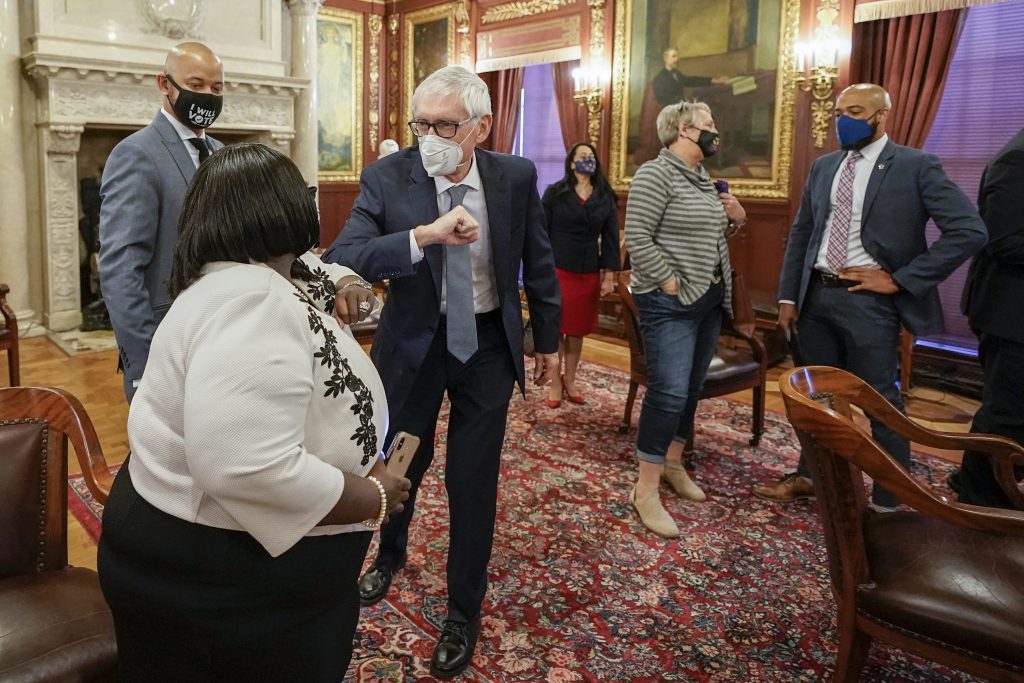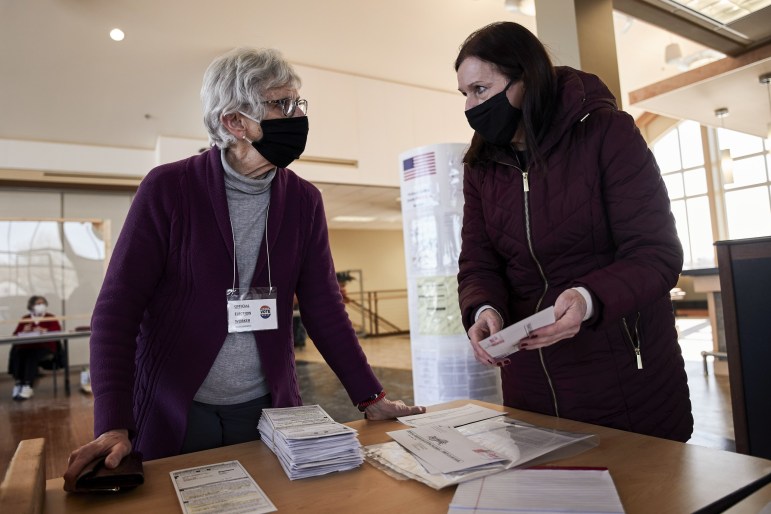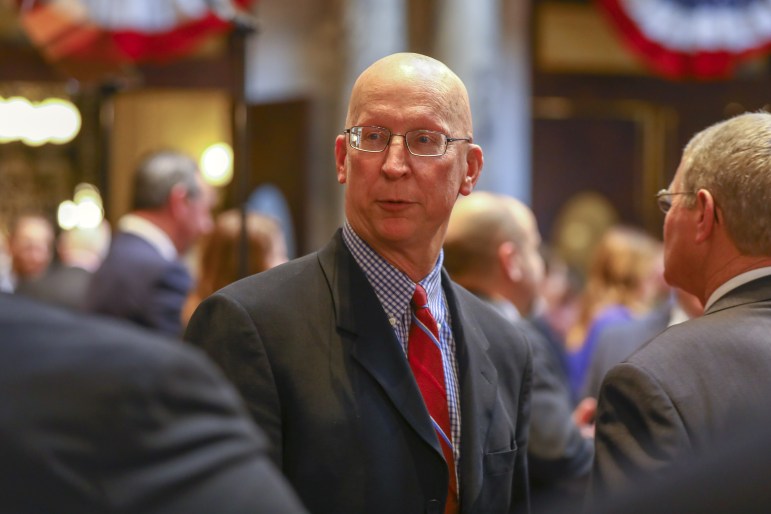Parties Divided on State Election Reforms
But there is bipartisan support for quicker voting. Will anything get passed?

Gov. Tony Evers gives an elbow bump to state Rep. Shelia Stubbs, D-Madison, after Democratic members of Wisconsin’s Electoral College cast their votes at the state Capitol in Madison, Wis., on Dec. 14, 2020. Some Republican lawmakers want to award Electoral College votes by congressional district — a proposal that would have given President Donald Trump six of the state’s 10 votes. Joe Biden got all of the votes because he won Wisconsin. (Morry Gash/AP Pool)
Proposals to change Wisconsin’s voting system could determine how one of America’s top swing states picks congressional candidates, how it awards its 10 Electoral College votes, how fast results can be announced and who can use the increasingly popular method of absentee voting.
But the political divisiveness that caused Wisconsin to flip from red to blue by the slimmest of margins in the 2020 presidential race will likely continue, stymying all but the few changes that enjoy bipartisan support. A Republican-led Legislature and a Democratic governor mean that purely partisan priorities are unlikely to make their way through, experts told Wisconsin Watch.
And a sweeping Democratic bill to broaden access to voting and thwart partisan gerrymandering nationwide faces a steep climb in the U.S. Senate after passing the House on a party-line vote late Wednesday.
Democrats are generally seeking to make it easier to vote, citing national security assessments that the 2020 contest was among the most secure ever. Republicans insist the high-turnout election was rife with fraud — although election officials of both parties and judges at all levels have rejected those allegations — and are generally seeking to add more restrictions and safeguards.
In late February, Republicans in the Wisconsin Legislature began circulating a slate of bills that would, among other changes, tighten absentee voting and the definition of “indefinitely confined” voters, two components challenged by President Donald Trump’s campaign in Democratic-majority Dane and Milwaukee counties in a failed attempt to throw out votes. Three Democratic members of the Assembly Elections Committee called the proposals “a full-on assault on our elections and the ability for Wisconsinites to vote.”
But dramatic changes to Wisconsin’s election laws are unlikely in the short term, said David Canon, a political scientist at University of Wisconsin-Madison.
“Any efforts aimed at making it easier to vote aren’t going to happen because the Republican leadership and state Legislature won’t want to do that. Anything that’s aimed at restricting access to voting won’t happen because (Democratic Gov. Tony) Evers would veto that, and they wouldn’t have enough votes to override the veto,” Canon said. “I think we’re in status quo mode for the next two years, at least, with nothing really changing.”

Election worker Josh Del Colle counts ballots at the Milwaukee Central Count location after the polls had closed for the evening, on Nov. 3, 2020. Proposals to allow clerks to begin processing absentee ballots before Election Day — and avoid such late-night vote counting — are gaining bipartisan support in Wisconsin. (Eric Kleppe-Montenegro for Wisconsin Watch)
A spokesperson for Evers declined comment on which bills he was likely to sign or veto, but referred Wisconsin Watch to the governor’s proposed budget, which includes proposals to establish automatic voter registration; expand the timeline on absentee voting; and require the Legislature to consider the recommendations of Evers’ People’s Maps Commission when drawing new political boundaries this year.
Atiba Ellis, a law professor at Marquette University who focuses on voting rights, said both election security and voter access are important. “They do not have to be at odds,” Ellis said. “But I think for politically motivated reasons they are put at odds, and that then justifies passing laws that are stricter than what the political science data says they need to be.”
Another bipartisan idea, which failed to make it through the last session, would allow clerks to process absentee ballots before Election Day, which supporters say would enhance voter confidence by preventing a delay in declaring statewide winners.
According to the Brennan Center for Justice, 43 states are weighing more than 250 bills to restrict voter access, largely on the basis of claims of electoral fraud in 2020 — claims that have been widely disproven and rejected by local, state and federal courts.
At the same time, a different set of 43 states is weighing at least 704 bills that would expand voting access. Lawmakers are particularly focused on absentee voting, the Brennan Center found, because of the COVID-19 pandemic, which kept a significant portion of the electorate from going to the polls on Election Day.
Process ballots sooner
In Wisconsin, Republicans and Democrats find some agreement around when absentee ballots can be processed. Wisconsin law bars processing until polls open on Election Day. In November, this meant that workers at Milwaukee’s central count, for example, worked until the wee hours of the morning, opening, unfolding and running hundreds of thousands of ballots through tabulating machines.
The Trump campaign capitalized on the late-night count to falsely claim that Milwaukee had “dumped” ballots that swung the election for President Joe Biden.
“What people didn’t understand is those votes came in in Milwaukee at 2 in morning because that was the first time the elections officials had the chance to get to the machines and feed in the ballots,” said Kathleen Dolan, a professor of political science at the University of Wisconsin-Milwaukee.

Diane Coenen, Oconomowoc city clerk, drops off absentee ballots to polling station Chief Inspector Arlene Ziety, as she makes her rounds during a primary election on Feb. 16, 2021 in Oconomowoc, Wis. Coenen favors changes to election law to allow clerks to begin processing absentee ballots before Election Day. (Darren Hauck for Wisconsin Watch)
An easy fix would be to allow absentee ballots to be processed in advance of Election Day, experts say. In the last legislative session, lawmakers debated bipartisan legislation to allow this to happen — but the bill languished amid disagreement over the details, including how different municipalities would adapt that practice.
Republican lawmakers are again taking up the issue, but divisions are emerging over whether to opt for early processing, or change the rules for early voting. Rather than placing ballots in envelopes that election workers process later, some lawmakers are proposing letting early in-person voters directly feed their ballots into voting machines.
Diane Coenen, Oconomowoc city clerk and former president of the Wisconsin Municipal Clerks Association, favors the latter method. Coenen said that allows voters to remake their ballot immediately in the event of an error — rather than discovering a rejected ballot on Election Day. It would also buy time for clerks and poll workers to work with in-person voters, without needing to also process all absentee ballots at the same time.
“In today’s political environment,” Coenen added, “everyone wants the results fast.”
Congress mulls big changes
Nationally, Democratic lawmakers are pushing a sweeping voting reform package, HR 1, which includes measures including automatic voter registration and barring voter ID and witness requirements for mail-in voting. It also seeks to reduce “dark money” in campaigns and require states to create nonpartisan redistricting commissions to thwart partisan gerrymandering.
The ACLU has also called for changes to some campaign finance and lobbying provisions in the bill, saying they would limit free speech and could harm political advocacy.
The bill has passed in the House, but, in the face of this opposition, pundits say it faces a steep hill towards passage in the Senate. It would need unanimous Democratic support — and 10 GOP votes unless the Senate filibuster rules are changed — to land on Biden’s desk. He has signaled that he will sign it.
On Sunday, the president took his own action, issuing an executive order requiring federal agencies to expand dissemination of information about registration and voting and studying ways to improve access for military and overseas voters, Native American voters, voters with disabilities and people in federal custody. Biden issued the order to mark the 56th anniversary of “Bloody Sunday,” when troopers beat and tear-gassed voting rights activists, including the late Rep. John Lewis, in Selma, Alabama.
Electoral College, drop boxes debated
Wisconsin is one of several states also considering changing how to award electors.
As proposed, Wisconsin would award them by congressional district, rather than winner-takes-all. In 2020, this would have resulted in six of the state’s 10 electors going for Trump, rather than Biden, who narrowly won the state’s popular vote. Because of Wisconsin’s partisan gerrymandering of congressional districts, experts say the proposal would redistribute electoral power away from the areas that hold Wisconsin’s urban — and mostly Democratic — strongholds.
Republican lawmakers supportive of these and other proposals say they would restore faith in the fairness of elections.

Sen. Duey Stroebel, R-Saukville, is seen at the State of the State address at the Capitol in Madison, Wisconsin on Jan. 24, 2018. Stroebel has sponsored several bills to add restrictions on absentee voting, which he says are aimed at boosting voter confidence in elections. (Coburn Dukehart/Wisconsin Watch)
Sen. Duey Stroebel, R-Saukville, who is sponsoring many of the not-yet-introduced bills, said he is concerned about the huge jump in the number of people who claim to be “indefinitely confined,” meaning they can vote absentee without presenting a photo ID.
Stroebel also criticized the proliferation of drop boxes in the November election. These are not regulated by state law, although elections officials say they comply with federal guidance on how they should be secured. The bill would require that boxes be “tamper-resistant and moisture-resistant” with a slot “only large enough to allow for the insertion of an absentee ballot.”
“Throughout 2020, gaps, loopholes and outright violations of the clear intent of the law plagued the election process,” Stroebel said in a statement to Wisconsin Watch. “The COVID-19 pandemic combined with a hotly contested presidential election were a tremendous stress on the system, and offered the Wisconsin Elections Commission and some — but not all — local election officials a chance to disregard the plain meaning of the law.”
Tammy Patrick, a senior advisor at the Democracy Fund, a Washington, D.C.-based voting advocacy group, favors the increased use of drop boxes that were prevalent during the November election. The city of Madison also created Democracy in the Park, in which voters handed absentee ballots to election officials at city parks.
GOP proposals would limit both practices. One bill would dictate that each municipality must have no more than one drop box — so hundreds of thousands of voters in Milwaukee would have the same number of absentee ballot boxes as a town with a few hundred voters.

A man drops off his absentee ballot at James Madison Park in Madison, Wis., as part of a Democracy in the Park event on Sept. 26, 2020, which allowed residents to register to vote or drop off their absentee ballots in any of the city’s public parks. Republicans challenged the event, but state election officials said it was legal. Now, GOP lawmakers want to limit such events. (Will Cioci/Wisconsin Watch)
Another measure would appear to ban events like Madison’s Democracy in the Park in which poll workers gathered completed ballots at more than 200 sites in late September and early October. This proposal would require a single site for collecting ballots no more than 14 days before an election and at a location that is “as near as practicable to the office of the municipal clerk.”
Stroebel said these and other measures are aimed at introducing uniformity across the state to create “complete trust in our elections” and to ensure that absentee ballot procedures “comply with existing statutes.”
Patrick countered that drop boxes are “embraced all across the country” but Republicans demonized them in 2020 as “somehow jeopardizing the integrity of the election — and that is really problematic.”
False fraud claims persist
In fact, false claims of fraud continue to motivate many GOP proposals — and raise concerns among the public. Prior to the November election, one Reuters poll showed that three-quarters of American voters feared electoral fraud would tip the election. In late January, after Biden was sworn in, a Monmouth poll found one-third of Americans believed his victory was due to fraud.
The Wisconsin State Journal examined thousands of complaints to lawmakers about the election, finding a lot of “hearsay or minor administrative errors” but just 28 allegations that were specific enough to examine.
And the newspaper found only one claim could be partially substantiated — that ballots from 42 early voters who died before Election Day were counted.
UW-Madison political science professor Ken Mayer said maintaining a high level of security is “absolutely crucial,” but fraud of the kind that was claimed in 2020 is “vanishingly rare.”
Wisconsin voting mostly smooth
Experts say despite the rancor, Wisconsin’s elections tend to be well-run.
“By and large, people who are in charge of our elections do their jobs well and acquit themselves well,” Dolan said.
The glaring exception was the April primary at the outset of the COVID-19 pandemic, which saw long lines in Milwaukee and thousands of rejected ballots statewide as clerks scrambled to staff the polls and hundreds of thousands of voters switched to absentee voting, many for the first time.

The voting line wraps around the block outside Washington High School in Milwaukee during the primary election on April 7, 2020. Election officials and advocates say the Nov. 3 election was much smoother, with more polling places and few problems reported. (Coburn Dukehart/Wisconsin Watch)
As the pandemic ground on, election officials adjusted, and the Nov. 3 election was largely a success, with a record 72% of all eligible voters turning out, according to a report by a coalition of Wisconsin groups that favor expansive access to voting.
Problems in November were “limited and site-specific, rather than the result of a generalized inability of the system to handle a large turnout amid changes in the law,” the report found. One marker of success: a plunging rate of rejected ballots, 0.2% in November compared to 1.8% in April.
Mayer, who studies election administration, said while there was a lot of talk about fraud in the 2020 general election, the bigger danger to election integrity is voter disenfranchisement.
“You have to worry about the things that are actually real,” Mayer said. “And one of the things that undermines the integrity of the election process is when you have lots of people … who are unable to vote, whether it’s long lines or (voter) ID (requirements) or other things — that that’s actually a threat to the integrity of the system.”
The nonprofit Wisconsin Watch (wisconsinwatch.org) collaborates with WPR, PBS Wisconsin, other news media and the University of Wisconsin-Madison School of Journalism and Mass Communication. All works created, published, posted or disseminated by Wisconsin Watch do not necessarily reflect the views or opinions of UW-Madison or any of its affiliates.
-
Legislators Agree on Postpartum Medicaid Expansion
 Jan 22nd, 2025 by Hallie Claflin
Jan 22nd, 2025 by Hallie Claflin
-
Inferior Care Feared As Counties Privatize Nursing Homes
 Dec 15th, 2024 by Addie Costello
Dec 15th, 2024 by Addie Costello
-
Wisconsin Lacks Clear System for Tracking Police Caught Lying
 May 9th, 2024 by Jacob Resneck
May 9th, 2024 by Jacob Resneck




















